Socially Active Young Woman Asks To Be Judged On Reddit After Repeatedly Refusing To Take Care Of Her Roommate's Dog
Let's be clear here. If you have a dog and you live with a roommate, you should never push your responsibilities onto them.
Even if they do volunteer to take care of the dog from time to time, you should make it a point not to inconvenience your roommate. And if they refuse to do it at all?
Find someone else to do it instead of making a big deal out of it or leaving your poor pup neglected. Taking on the responsibility of owning a dog means being a responsible pet parent, including taking care of all their needs, not just the convenient ones.
Your roommate shouldn't have to do everything for you. It's not fair to them.
If you want the joys of having a dog as part of your family, make sure you're ready for the responsibilities that come with it. Period.
Don't be like this person who suddenly expects her socially active roommate to take responsibility while she's away for work. The dog owner was even upset about the refusal.
But when you think about it, the roommate has every right to refuse the request. It's not like she's going to get paid for it.
And it was the dog owner's fault for taking on a schedule she can't handle.
A young woman decided to have a roommate in her home to lighten the load on the bills. Her roommate owns a dog.
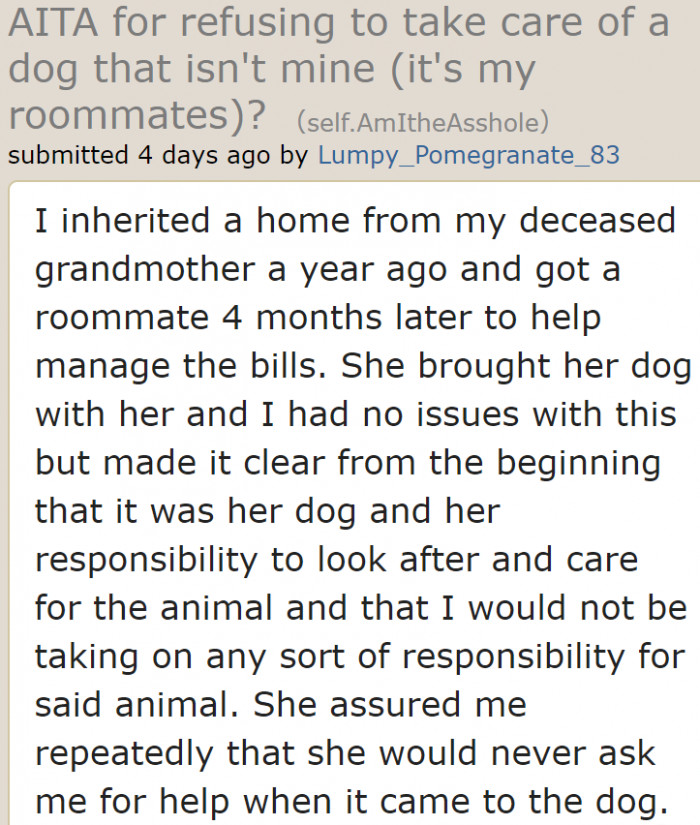
The original poster (OP) is a student with a very active social life.
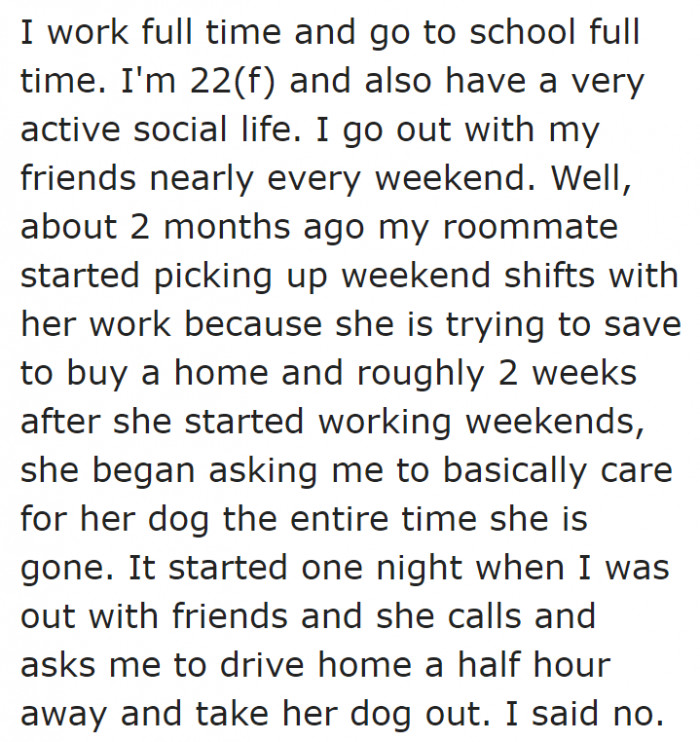
Her entitled roommate got upset with her for her refusal to take care of the dog.
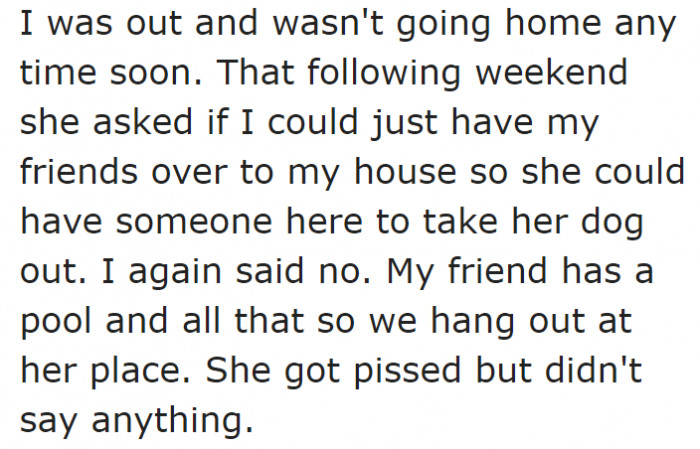
Understanding Responsibility
Psychological research emphasizes the importance of personal accountability, especially in shared living situations. A study published in the Journal of Social Psychology indicates that individuals often feel less responsible for tasks when they believe others will pick up the slack.
This diffusion of responsibility can lead to resentment and conflict among housemates. Thus, establishing clear boundaries and expectations regarding shared responsibilities is crucial for maintaining healthy relationships.
Building Mutual Respect
According to social psychologists, mutual respect is fundamental to any successful relationship, including those between roommates. Research indicates that when individuals feel respected, their willingness to cooperate increases significantly.
Implementing practices such as acknowledging each other's efforts and maintaining open lines of communication can cultivate an atmosphere of respect. This, in turn, encourages collaboration on shared responsibilities, including pet care, leading to a more harmonious living environment.
Understanding Boundaries in Shared Living Spaces
Dr. Rachel Klein, a family therapist at Columbia University, emphasizes the significance of setting boundaries in shared living situations.
Her research indicates that clear boundaries can prevent misunderstandings and foster healthier relationships between roommates.
When boundaries are not respected, resentment can build, leading to conflict and emotional distress.
Exactly. It's not the OP's problem at all.
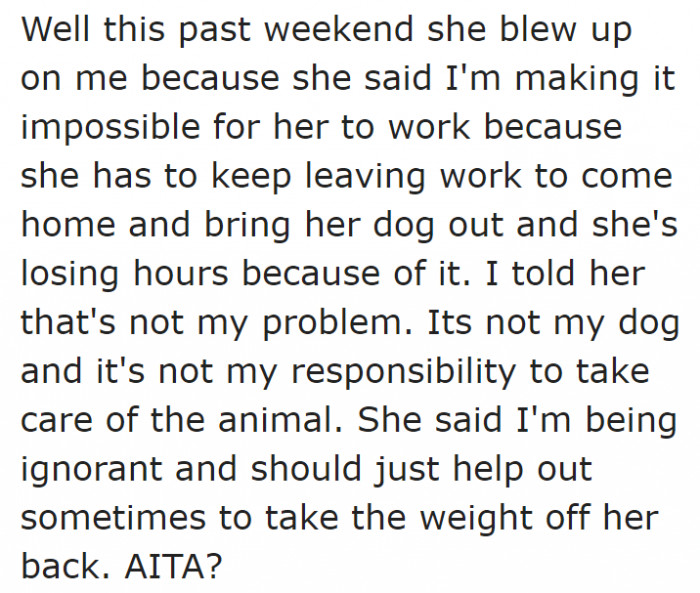
Time to let go of the roommate!

The roommate has no right to force the responsibility onto the OP.
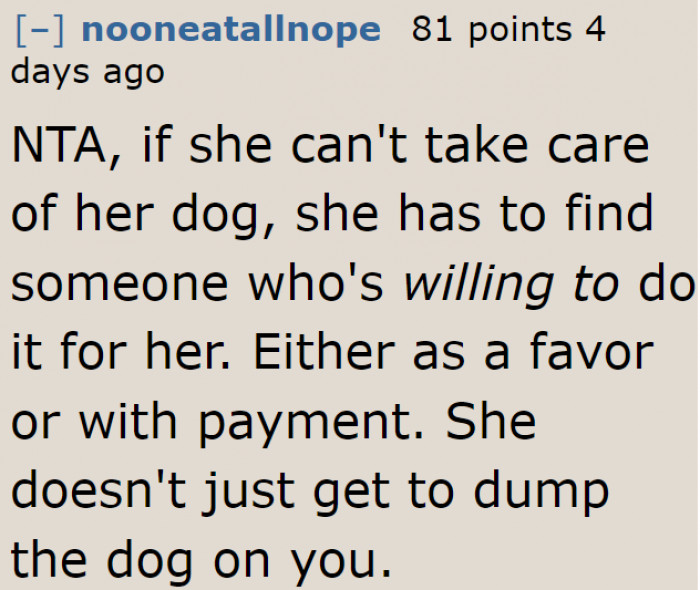
Dr. Susan Johnson, a renowned clinical psychologist, suggests that emotional attachment in roommate dynamics plays a significant role in conflict resolution. According to her research, clear communication about individual responsibilities can decrease tension and resentment.
She recommends using 'I' statements to express feelings without blaming the other party, fostering a collaborative environment where both roommates can negotiate responsibilities amicably. This approach not only builds stronger relationships but also enhances emotional intelligence in interpersonal interactions.
In situations where expectations are unclear, individuals may often feel taken for granted, leading to frustration.
Studies show that feeling undervalued in shared responsibilities can exacerbate stress and negatively impact mental health.
Communicating openly about responsibilities can help mitigate these feelings and promote collaboration.
Pet dogs can never have independence. They will always need their humans.
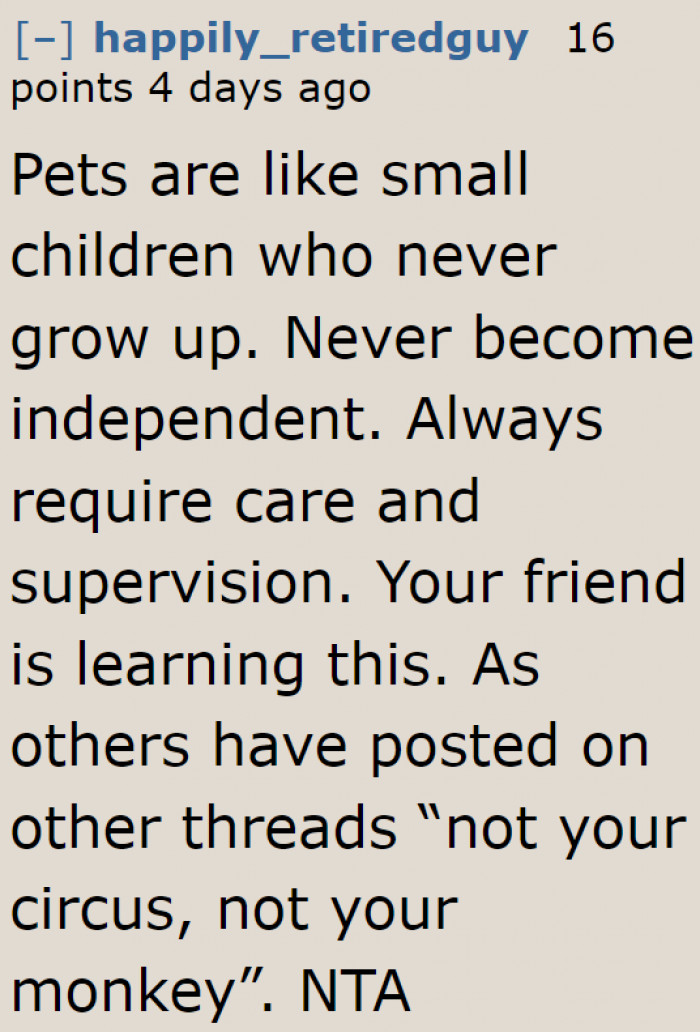
She should've considered her dog before taking an extra shift at work.
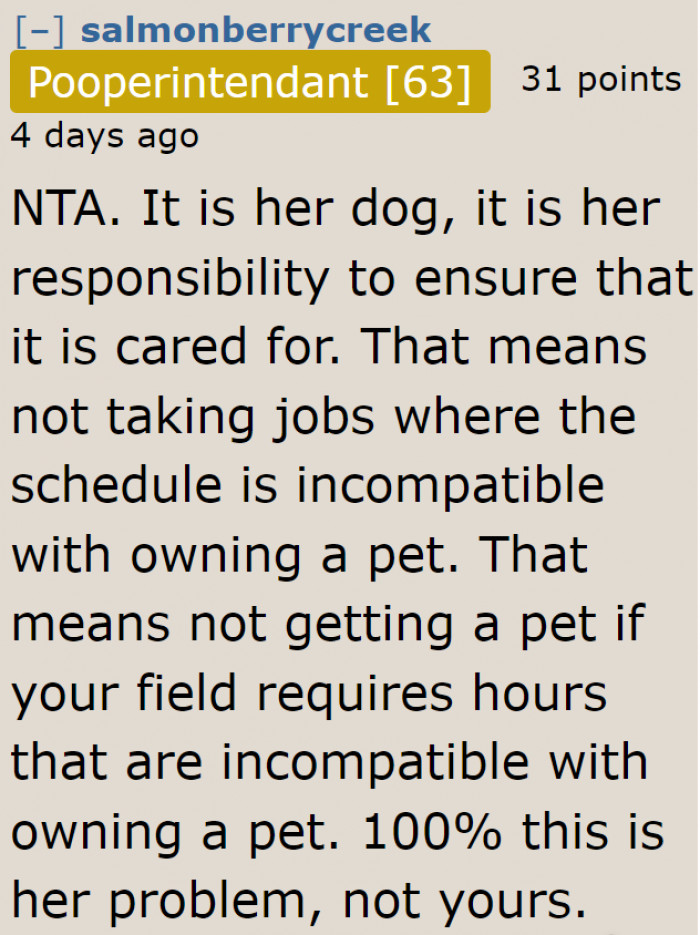
Since she owns the house, the dog owner is more like a tenant than a roommate.

The Role of Negotiation
Negotiation within shared living arrangements can enhance interpersonal dynamics, according to conflict resolution studies. Dr. Daniel Goleman, an emotional intelligence expert, emphasizes that "collaborative negotiation fosters understanding and satisfaction in relationships," which can be crucial in shared living situations. By actively discussing and redefining responsibilities, both roommates can foster a sense of shared ownership, reducing the likelihood of resentment or conflict over household chores. For more insights, visit Daniel Goleman's website.
The Emotional Toll of Caretaking Responsibilities
Caretaking roles can create significant emotional strain, especially when they are not mutually agreed upon.
Research in psychology highlights that unreciprocated responsibilities can lead to feelings of burnout, particularly in individuals who already have demanding schedules.
Recognizing and addressing these feelings is essential for maintaining mental health and well-being.
The OP can always remind the roommate about the boundaries they've set.
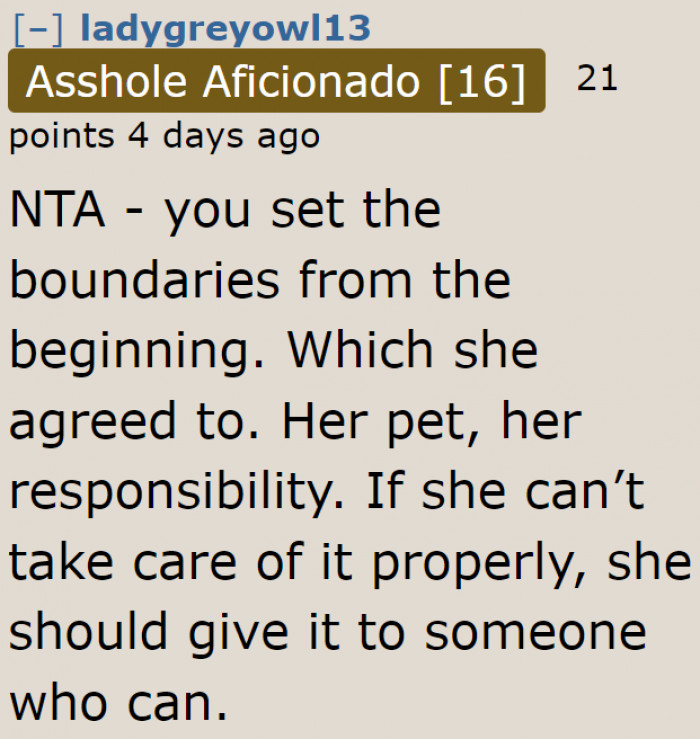
Since she took additional shifts and has extra money, she should be able to pay for a dog sitter or walker.

This roommate is being toxic.
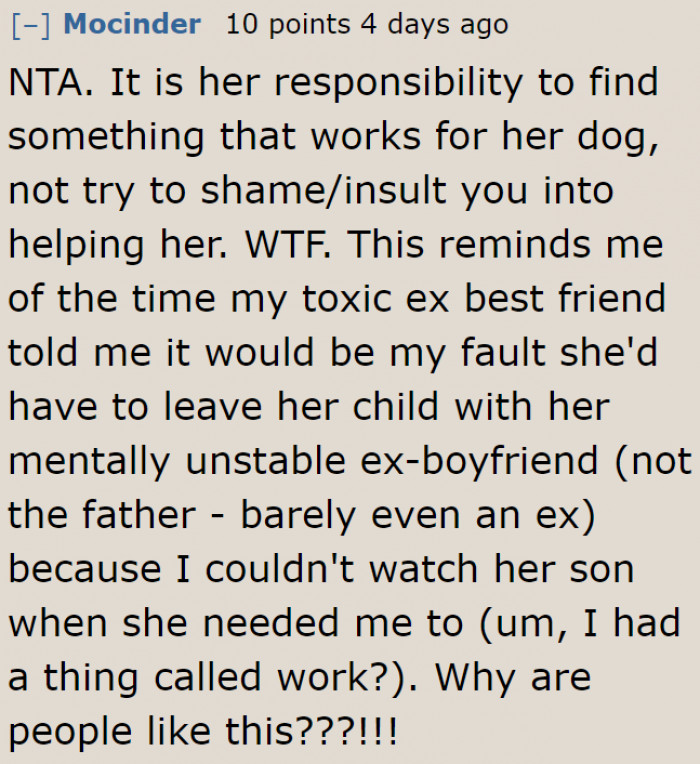
Behavioral psychologists note the impact of reinforcement on responsibility. When one roommate consistently takes care of their dog's needs, they reinforce their role, potentially leading to imbalanced dynamics.
Implementing a chore chart or rotating responsibilities could encourage shared commitment. Research has shown that establishing a system of accountability promotes fairness and can enhance mutual respect and collaboration between roommates.
A practical approach for the Redditor is to have an honest conversation with their roommate about expectations and responsibilities regarding the dog.
Engaging in a negotiation about shared duties can help ensure both parties feel valued and understood.
Additionally, seeking support through counseling or a mediator can provide a structured environment for discussing these sensitive issues.
The roommate thinks she can try for the mile.

The OP's priority is her social life. And that's completely okay.
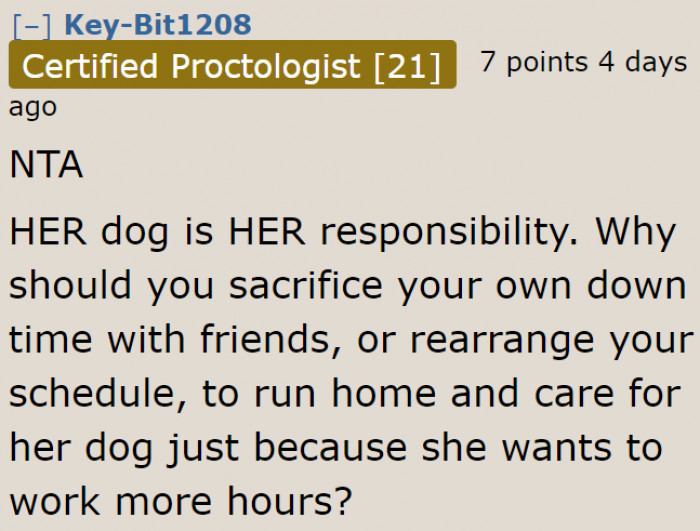
She needs to look for someone else to take care of the dog, even if it means paying for it.

Cognitive Dissonance in Relationships
Cognitive dissonance theory suggests that individuals strive for internal consistency between their beliefs and behaviors. When a roommate feels obligated to care for a dog they didn't adopt, it creates discomfort and conflict.
Studies show that addressing these feelings through open dialogue can alleviate dissonance and lead to healthier relational dynamics. Acknowledging discomfort allows roommates to renegotiate roles, ultimately fostering a supportive living environment.
The OP already did the roommate a favor by allowing her to keep a dog.
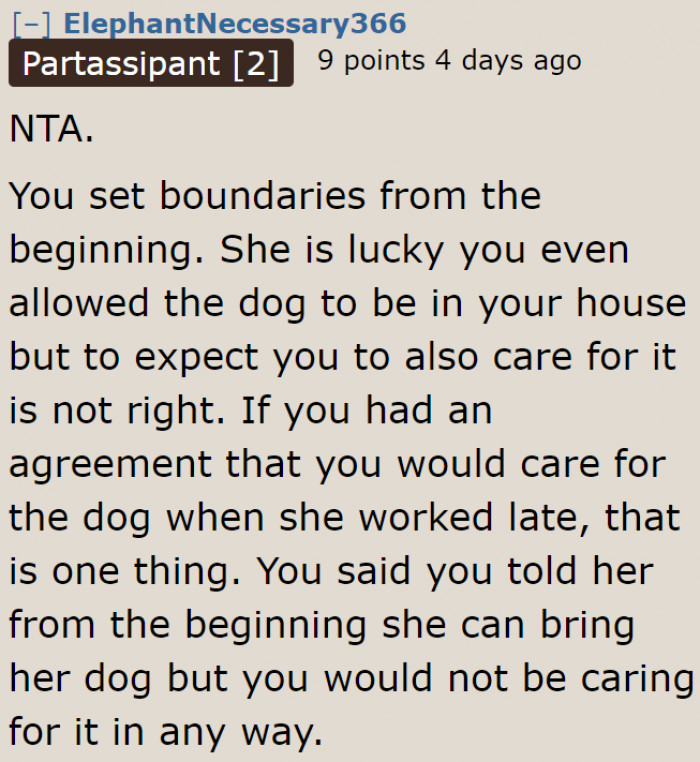
The roommate took on an extra responsibility that she can't handle. That's not the OP's fault.
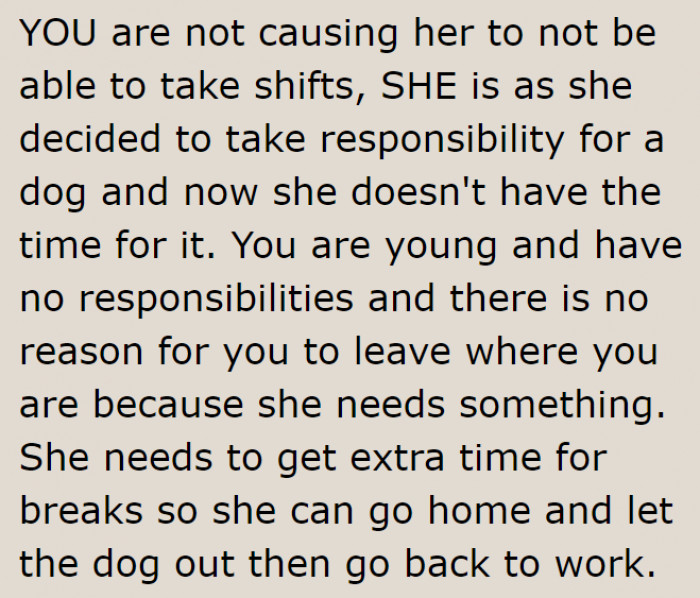
The roommate is forgetting something. Or maybe she purposely forgot it to have her way.
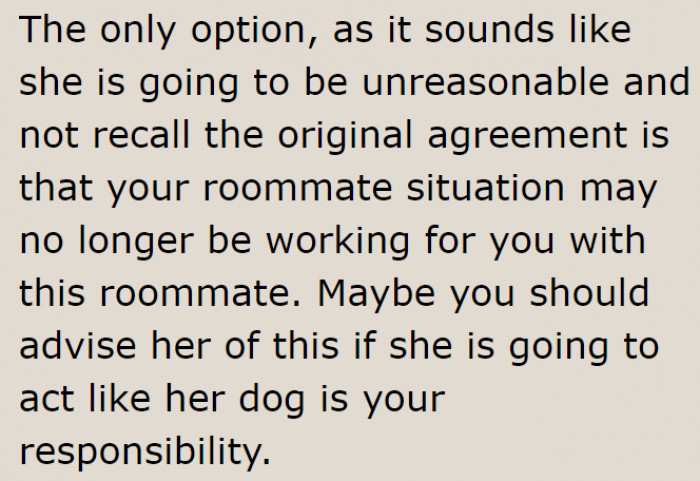
Research indicates that a lack of empathy can exacerbate roommate conflicts, particularly concerning shared responsibilities. Dr. Jonathan Haidt, a social psychologist, emphasizes that "empathy is crucial for understanding others' perspectives, which can lead to more effective conflict resolution." His insights can be found on his professional website, jonathanhaidt.com. Encouraging open discussions about feelings related to responsibilities can nurture empathy, leading to a more harmonious living situation where both parties feel valued and understood.
What a responsible adult does.
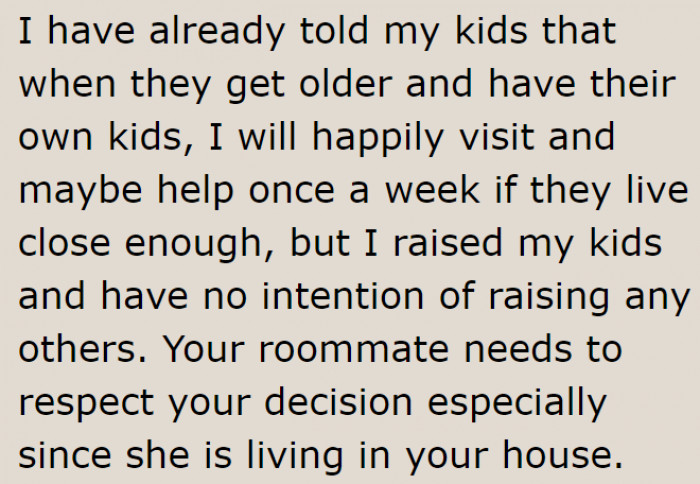
The OP shouldn't bend over backwards because of an irresponsible roommate.

The roommate's request was unreasonable in the first place.

The Impact of Living Arrangements
Living with others significantly impacts mental health and emotional well-being. Research shows that supportive living environments can lead to improved self-esteem and reduced anxiety levels.
Creating an open atmosphere where both roommates feel comfortable expressing their needs and concerns can foster a healthy, cooperative living situation. This not only enhances personal relationships but also promotes overall mental well-being, as a stable home environment positively influences psychological resilience.
The OP has zero responsibility for the dog.
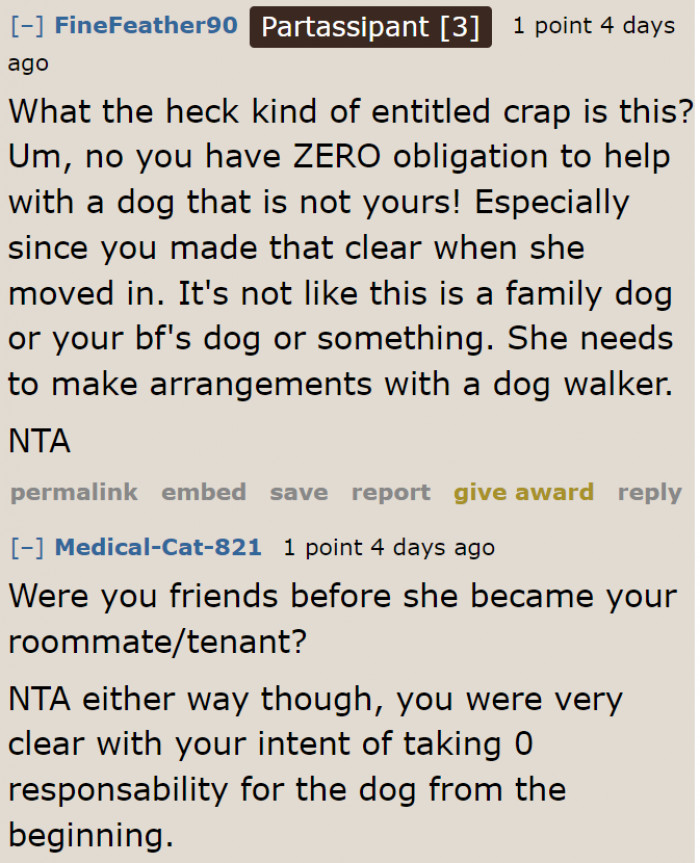
Some Redditors agree that it's not a roommate-roommate setup, but a landlady-tenant one.
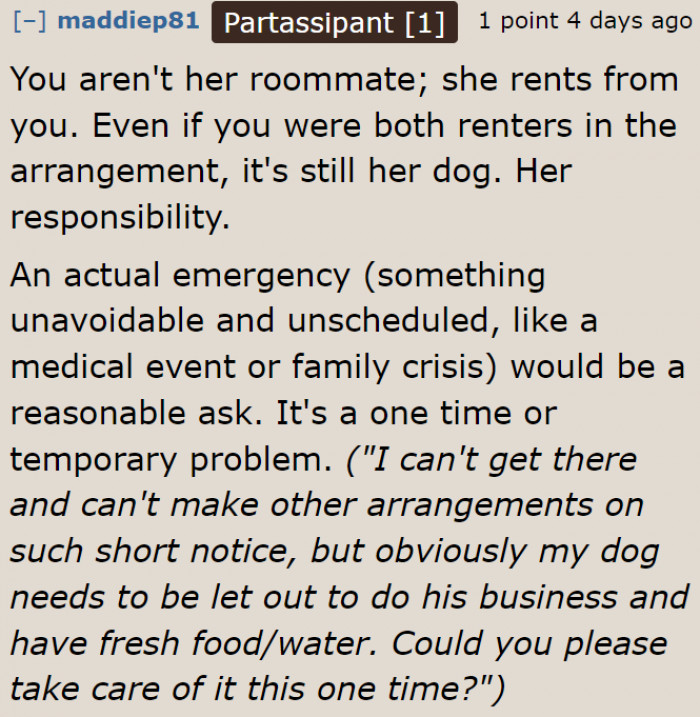
If the roommate gets too unreasonable, maybe it's time to evict her.
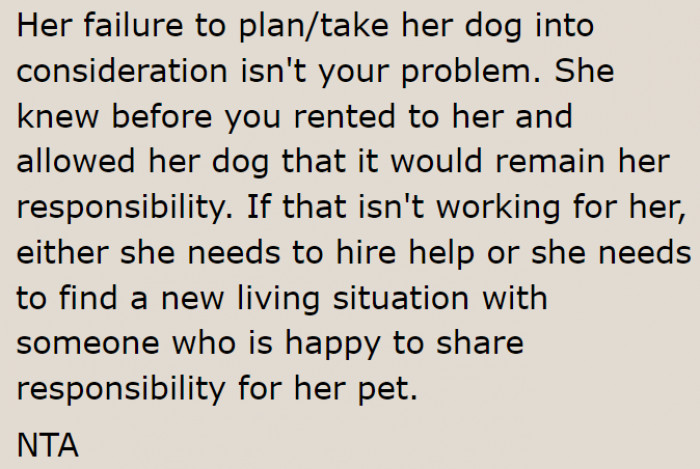
Establishing routines in shared spaces can greatly improve roommate relationships. A study published in Frontiers in Psychology highlights that regular communication and routine-setting can mitigate misunderstandings and promote accountability.
Roommates should engage in regular check-ins to discuss responsibilities and share feedback, fostering a sense of teamwork and reducing the likelihood of conflicts over responsibilities like pet care.
Roommate ≠ Pet sitter
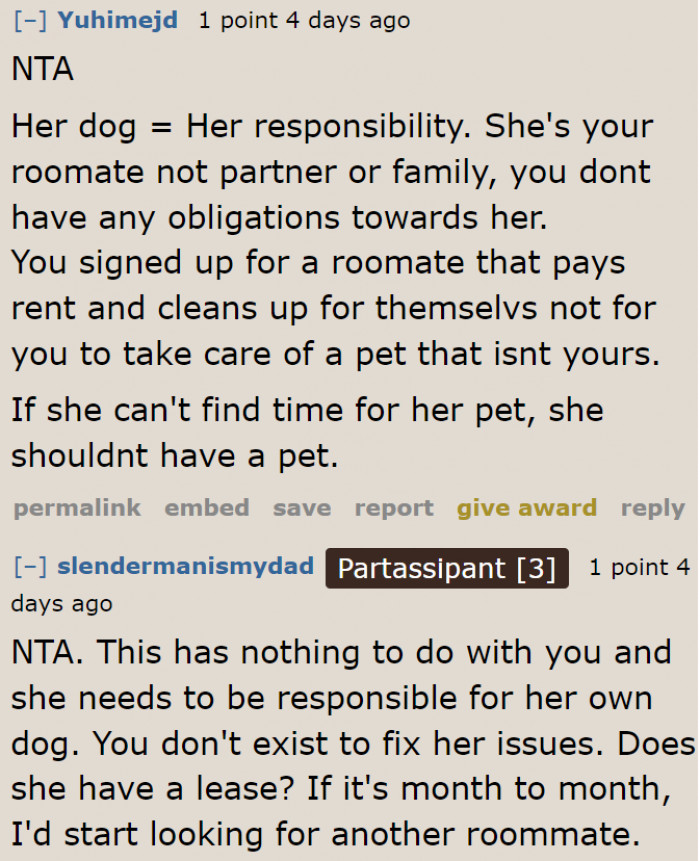
The roommate needs to get it together and find someone else who will take care of her dog. The OP shouldn't have to do everything for this irresponsible dog owner.
And if the OP does evict the roommate, maybe it's time for her to create a written agreement so that she can always refer to it whenever there are problems with a roommate/tenant.
Psychological Analysis
This scenario illustrates the challenges of navigating shared responsibilities in a household.
It's crucial to recognize the importance of open communication and mutual respect in maintaining healthy relationships.
Analysis generated by AI
Analysis & Alternative Approaches
Establishing clear boundaries and open communication is vital in shared living situations to prevent conflict. According to Dr. Alexandra Solomon, a relationship therapist, "Healthy relationships are built on clear communication and mutual respect." This sentiment is echoed by Dr. Gary Chapman, a marriage counselor, who emphasizes that "understanding each other's needs and expectations is crucial for harmonious living." Both experts highlight the importance of addressing relationship dynamics to foster healthier interactions.
Behavioral Analysis & Pathways Forward
In conclusion, understanding the psychological dynamics at play in shared living situations is essential for fostering healthy relationships. Research consistently shows that clear communication, mutual respect, and defined responsibilities can alleviate conflicts.
As noted by conflict resolution experts, these strategies not only enhance interpersonal dynamics but also contribute to emotional well-being. By applying these principles, roommates can create a harmonious living environment that supports both personal growth and cooperative living.



